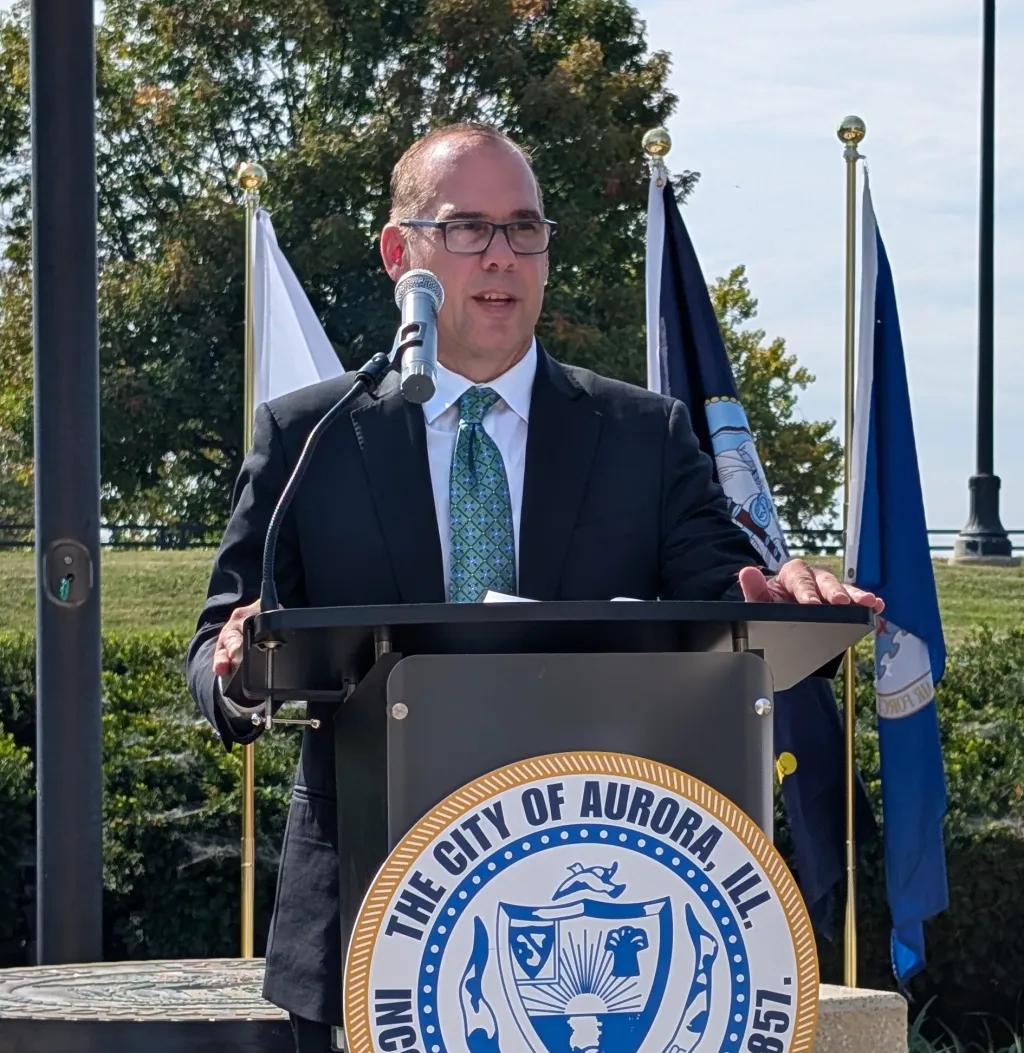
Aurora Mayor John Laesch is proposing a number of ethics reforms aimed at campaigns for city elected offices.
The proposed changes to city code would put a $500 cap on campaign donations from those doing business with the city or looking to, would expand required economic interest disclosures and would set limits on how city property can be used for political purposes, among other things.
The Aurora City Council’s Rules, Administration and Procedure Committee is set to hear the proposals at 3 p.m. on Tuesday.
Laesch told The Beacon-News in an interview Monday that the proposed code changes were designed to increase transparency and “reduce the influence that outside money has on city contracts.”
Campaign ethics reform was a campaign promise for Laesch, who won the mayoral seat over former Mayor Richard Irvin in April. During the most recent campaign and in a previous unsuccessful run for mayor, Laesch claimed Irvin prioritized government contracts or incentives to those who donated to his campaign, which Irvin consistently denied.
The newly-proposed city code changes would limit contributions to candidates or elected officials from those doing business or looking to do business with the city to $500 per year, according to a draft of the proposed ordinance.
“We don’t want people who have an interest in city business buying access through the mayor’s office or the aldermen,” Laesch said.
The limit is proposed to be $500 as a starting place, according to Laesch. He and some aldermen think candidates shouldn’t take any money from those doing business with the city, but others wanted a higher cap or none at all, he said.
Counting towards the $500 cap would be donations made by the business itself as well as any made by parent companies or subsidiaries, and in some cases donations made by employees themselves.
Candidates for city office would also be barred from accepting cash contributions of over $150 or any amount from anonymous or pass-through donations, according to the proposed changes. Lobbyists would also face restrictions around contributing to city elected officials or candidates.
Those who do not follow these proposed rules could be barred from doing business with the city.
The changes are being proposed, Laesch said, because he does not believe state law is strict enough. There aren’t restrictions for those doing business with the city, “which is where the appearance of ‘pay-to-play’ exists,” he said.
He noted that Chicago has similar restrictions on campaign donations from those doing business with the city. Chicago city code shows its cap is set at $1,500 per year.
Plus, Laesch said he ran on a platform of ethics reform and got elected, so he feels like there is strong public support for this.
Laesch also expects the city to receive more bids for contracts long-term as a result of these changes, he said, since those bidding will feel like there is a fair process.
“If you’ve tried two or three times and the same contractor keeps winning the bid, eventually you quit trying and investing your time,” he said. “You go fish in other ponds.”
Also under Laesch’s proposed code changes, those in office and those running for a city elected office would need to provide more information than what is typically required in economic interest filings.
Candidates and elected officials would be required to disclose not only their occupation but also if their employer has ever done work for, or received any financial assistance from, the city of Aurora.
Plus, candidates and elected officials would be required to list all real estate they own within the city or within one-and-a-half miles of city limits. The candidate or official must also list those properties owned by their spouse or their children under 18 years old.
Disclosures would also need to include any organizations or businesses owned by candidates or elected officials, and if that group has recently applied for anything requiring city approval.
If the candidate or elected official has received any gifts, forgiven loans or services from those doing business with the city or looking to, that would also need to be disclosed under the proposed new rules.
Candidates and elected officials would also need to list any city-funded or affiliated organizations they are involved with.
The expanded disclosures are intended to “probe a little bit deeper,” and the questions might point towards potentially unethical behavior, Laesch said.
Those filings would only need to be turned in once per year, rather than each quarter, to help ease the burden on staff, according to Laesch. He said that, after the disclosures are turned in on Jan. 31, they would be available for the public to view online.
The proposed code changes would also set limits around ways city property can and cannot be used for campaign purposes.
The Rules, Administration and Procedure Committee is expected to consider the proposed ethics reforms and vote on a recommendation at its meeting Tuesday. If it is recommended for approval, it will then go before the Committee of the Whole before heading to the Aurora City Council for final approval.
rsmith@chicagotribune.com